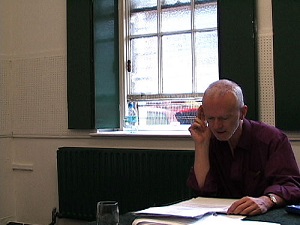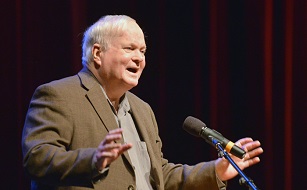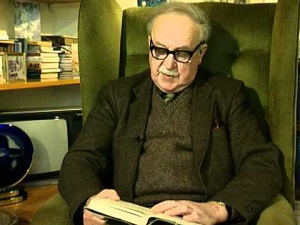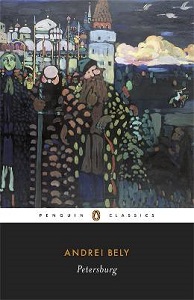|
De Ierse dichter Trevor Joyce werd geboren op 26 oktober 1947 in Dublin. Zie ook alle tags voor Trevor Joyce op dit blog en ook mijn blog van 26 oktober 2010
Without Asylum
for Angela
true we may surmise
how a knife hatched
out of meat
should fledge
span with blade
then unexpectedly
take flight onto some sill
moult there with clutch
of fist falling from it
arm with balance
of muscles altering
to lift and lay
its murderous
intent and disturbed
dreams and brood
how everything broken
so they say points
to the unbroken
forgetful is it of what did
the breaking as I witness
my own loathing
and desire walk
through the dreaming
labyrinth of my child
while detailed depositions state
how further on
within the wood
whose skew bent
registers which wind
prevails itself perpetually
ragged and worn
from ocean breath
and sun and every flame
it quenched in its far
fetch the bright axe
blossom suddenly
the long bones lever
up from it like anthers
and beyond the startling
calyx of teeth
an avid buzzing perishable
fruit set thicken
and disintegrate
to load with sweet
secure deposits
of afflicting gold
their remote cells
and stipulate eventual
shelter from the fall
asylum from the edge
a luminous domain
unbounded
seldom they relate
why the innocent whose mouth
is like a bowl of blood
blurts words already
darkened with gods
and sacrifices how
I have the face of those
whose faces have rotted
and although whirring blades
have been observed
to crystallize spontaneously
throughout the native
rock and ramify
in gangs and casual crews
good companies exfoliate
pervasive and exotic dust
where tellers and their firm
controllers fight to reconcile
accounts and sound
is severed from the dogs throat
there is no further testimony
to the effect how in this
realm of agents deeds
and instruments
one sees at last displayed
an armoured beast whose
head a growth of flame
in the shadow of the ripening
clocks the river sames
destroys itself the jug
absconds leaving to the grasp
only a sustained bewilderment
like dice spinning

Trevor Joyce (Dublin, 26 oktober 1947)
De Amerikaanse schrijver Pat Conroy werd geboren op 26 oktober 1945 in Atlanta, Georgia. Zie ook alle tags voor Pat Conroy op dit blog en ook mijn blog van 26 oktober 2010
Uit: South of Broad
“He treated the stars as though they were love songs written to him by God. With such reverence he would point out Canis Major, the hound of Orion, the Hunter; or Cygnus, the Swan; or Andromeda, the Chained Lady; or Cassiopeia, the Lady in the Chair. My father turned the heavens into a fresh puzzlement of stars: “Ah, look at Jupiter tonight. And red Mars. And isn't Venus fresh on her throne?” A stargazer of the first order, he squealed with pleasure on the moonless nights when the stars winked at him in some mysterious, soul- stirring graffiti of ballet-footed light. He would clap his hands with irresistible joy on a cloudless night when he made every star in the sky a silver dollar in his pocket.
He was more North Star than father. His curiosity about the earth ennobled his every waking moment. His earth was billion-footed, with unseen worlds in every drop of water and every seedling and every blade of grass. The earth was so generous. It was this same earth that he prayed to because it was his synonym for God.
My mother is also a Charlestonian, but her personality strikes far darker harmonies than my father's did. She is God-haunted and pious in a city with enough church spires to have earned the name of the Holy City. She is a scholar of prodigious gifts, who once wrote a critique of Richard Ellman's biography of James Joyce for the New York Review of Books. For most of my life she was a high school principal, and her house felt something like the hallway of a well-run school. Among her students, she could run a fine line between fear and respect. There was not much horseplay or lollygagging about in one of Dr. Lindsay King's schools. I knew kids who were afraid of me just because she was my mother. She almost never wears makeup other than lipstick. Besides her wedding band, the only jewelry she owns is the string of pearls my father bought her for their honeymoon.”

Pat Conroy (Atlanta, 26 oktober 1945)
De Duitse schrijver Ulrich Plenzdorf werd geboren op 26 oktober 1934 in Berlijn.Zie ook alle tags voor Ulrich Plenzdorf op dit blog en ook mijn blog van 26 oktober 2010
Uit: Die neuen Leiden des jungen W.
„Er: Ich kann mich auch irren. Lassen Sie uns Ihre Sachen für ein paar Tage hier. Vier oder sechs Augen sehen bekanntlich mehr als zwei.
Ich packte ein. Eisern. Ein verkannteres Genie als mich hatte es noch nie gegeben.
»Trotzdem seid ihr in Berlin geblieben?« »Ed -ich nicht. Ich konnte das nicht. Aberich hab ihm noch zugeredet. Theoretisch war das auch richtig. Schließlich kann einer nirgends so gut untertauchen wie in Berlin und sich einen Namen machen. Ich meine, ich hab ihm nicht etwa gesagt, bleib hier oder so. Auf die Art kam man an Ed nichtran. Wir hatten in Berlin eine Laube. Wir kamen aus Berlin, als Vater hierher versetztwurde. Die Laube wurden wir nicht los, da sollten angeblich sofort Neubauten hin. Ichhatte für alle Fälle den Schlüssel. Diese Bude war noch ganz gut in Schuß. Wir nahmen sie also in Augenschein, und ich redete die ganze Zeit dagegen. Daß das Dach hin ist. Daß einer die ollen Decken vom Sofa geklaut hätte. Unsere alten Möbel waren da drin, wie das so ist. Und daß die Laube eben auf Abriß steht, wegen dieser Neubauten. Ed biß sich denn auch immer mehr fest. Er packte seine Sachen aus. Was heißt Sachen? Mehr als die Bilder hatte er eigentlich nicht, nur, was er auf dem Leib hatte. Seine Rupfenjacke, die hatte er sich selber genäht, mit Kupferdraht, und seine alten Jeans.«
Natürlich Jeans! Oder kann sich einer ein Leben ohne Jeans vorstellen? Jeans sind die edelsten Hosen der Welt. Dafür verzichte ich doch auf die ganzen synthetischen Lappen aus der Jumo, die ewig tiffig aussehen. Für Jeans konnte ich überhaupt auf alles verzichten, außer der schönsten Sache vielleicht. Und außer Musik.“

Ulrich Plenzdorf (26 oktober 1934 – 9 augustus 2007)
Scene uit een opvoering in het Landestheater Tübingen in 2010
De Schotse dichter Sorley MacLean (Schots Gaelic: Somhairle MacGill-Eain) werd geboren op 26 oktober 1911 Osgaig op het eiland Raasay.Zie ook alle tags voor Sorley MacLean op dit blog en ook mijn blog van 26 oktober 2010
A Highland Woman
Hast Thou seen her, great Jew,
who art called the One Son of God?
Hast Thou seen on Thy way the like of her
labouring in the distant vineyard?
The load of fruits on her back,
a bitter sweat on brow and cheek,
and the clay basin heavy on the back
of her bent poor wretched head.
Thou hast not seen her, Son of the carpenter,
who art called the King of Glory,
among the rugged western shores
in the sweat of her food’s creel.
This Spring and last Spring
and every twenty Springs from the beginning,
she has carried the cold seaweed
for her children’s food and the castle’s reward.
And every twenty Autumns gone
she has lost the golden summer of her bloom,
and the Black Labour has ploughed the furrow
across the white smoothness of her forehead.
And Thy gentle church has spoken
about the lost state of her miserable soul,
and the unremitting toil has lowered
her body to a black peace in a grave.
And her time has gone like a black sludge
seeping through the thatch of a poor dwelling:
the hard Black Labour was her inheritance;
grey is her sleep tonight.
Vertaald door Seamus Heaney

Sorley MacLean (26 october 1911 - 24 november 1996)
De Russische schrijver en theoreticus van het symbolisme Andrej Bely werd geboren op 26 oktober 1880 in Moskou. Zie ook alle tags voor Andrej Bely op dit blog en ook mijn blog van 26 oktober 2010
Uit: Petersburg (Vertaald door Robert A. Maguire en John E. Malmstad)
« But the differences are fundamental. Joyce’s creative impulse is towards expansion. Joyce wrote the book’s core – its plot, its bones – and then he added and added and added. No detail of environment or of consciousness was too minute to escape his agglomerative drive. This is Ulysses’ project – to incorporate everything – and the project is in principle endless. Joyce had to end it arbitrarily – by decreeing that the book would be published on his fortieth birthday. He could have kept on writing forever.
Bely’s revisions of Petersburg, on the other hand, were all about excision. Bely wrote the novel’s original draft between July 1911 and January 1912. He then couldn’t find a publisher. While he was searching, he completely reworked the novel. In 1913, after various troubles (at one point much of the book was actually set up in type before being abandoned), it started being published in instalments; then as a book proper in 1916. But Bely was still dissatisfied, and he set to work revising again. M&M: “Working more by massive cutting than by actual rewriting, he subjected the text to such changes that the result was virtually a new novel”. In 1922 this new novel was published by a firm in Berlin. And it’s this version that M&M translate.
Ulysses and Petersburg. Expansion and excision. These differences in approach speak of the different novels’ different spirits. If Ulysses wants to grasp the world in words, Petersburg’s keynote is the eloquent ellipsis. Despite Circe’s hallucinatory power, Ulysses’ guiding spirit is realist. It wants to describe. It wants to fully, adequately, maximally describe. Recall Joyce’s boast that, were Dublin raised to the ground, it could be rebuilt from scratch with Ulysses as the blueprint. Petersburg, on the other hand, couldn’t care less about the actual city. Petersburg’s Petersburg is a dream city, a nightmare city, a city of the mind and of the dead. Petersburg isn’t interested in the empirical world; it is after something that descriptive prose can’t give it. It is after something beyond thought, and beyond experience. It puts more faith than English literature likes to in madness. It puts faith in the senseless. You have to look to Lewis Carroll or Edward Lear to find in English literature the kind of cheerful ludicrous babbling that provides so much of Petersburg’s weight and heft.“

Andrej Bely (26 oktober 1880 – 8 januari 1934
Cover
|



